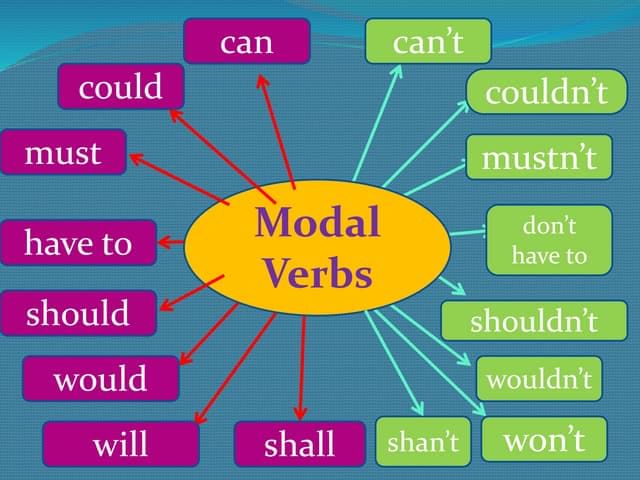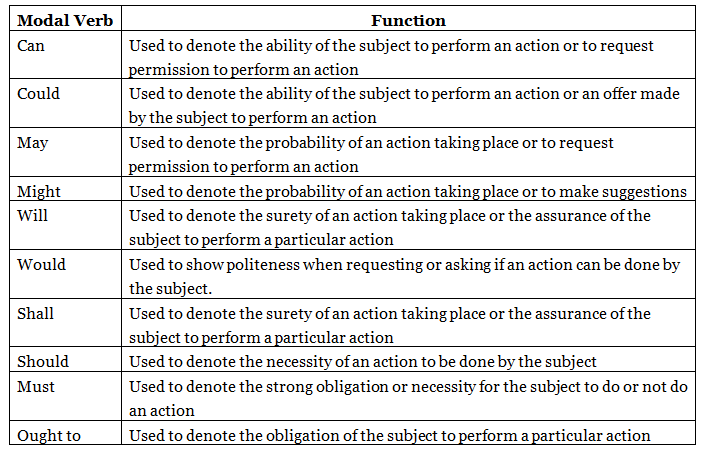Class 10 Exam > Class 10 Notes > English Grammar Basic > Modal Verbs
Modal Verbs | English Grammar Basic - Class 10 PDF Download
| Table of contents |

|
| What Are Modal Verbs? |

|
| Examples of Modal Verbs |

|
| How to Use Modal Verbs in Sentences |

|
| Test Your Knowledge of Modal Verbs |

|
What Are Modal Verbs?
Modal verbs are helping verbs that are used along with main verbs to represent the ability, possibility and probability of a subject to do an action and emphasise the necessity of an action.
Examples of Modal Verbs
Let us look at some examples of modal verbs used as auxiliary verbs and their functions.

How to Use Modal Verbs in Sentences
Given below are a few examples of how modal verbs can be used to indicate the possibility or probability of an action taking place.
- It might rain in the evening.
- I think they will reach Coimbatore by 8 pm.
- Can you pick up my brother from school on your way home tomorrow?
- I could make some time to help you with your assignments.
- Your friends may come to visit you next week.
- It would not be possible for you to complete all of it by tomorrow evening.
Here are some examples of modal verbs being used to show the necessity and obligation of the subject to perform a particular set of actions.
- All students of this institution ought to abide by the rules and instructions provided.
- All employees should follow the dress code strictly.
- You must get yourself checked before the situation becomes worse.
- Your sister will have to apply for a leave request if she wants to take a month’s leave.
Modal verbs can be used to make offers, suggestions and requests. Check out the examples given below for know-how.
- It would be better if you did it the other way.
- I could help you if you want.
- Shall I bring you some water to drink?
- Could you please pass me the science record?
- Will you please take care of my son for an hour? I have some grocery shopping to be done.
Test Your Knowledge of Modal Verbs
Fill in the blanks with the appropriate modal verb in the following sentences:
- ________ you be able to bring your camera when you come?
- Priya __________ apologise for the confusion that was caused yesterday because of her carelessness.
- You _______ finish this first and then start with the other one.
- ________ I make some tea for you?
- I ______ make sure to keep everything ready by the time they reach the railway station.
- You _______ see to it that the students are standing according to their roll numbers.
- ______ I come in?
- She _______ find it interesting as she likes reading adventure stories.
- Do you have any idea how much all of this _______ cost?
- ______ you please help me find my keys?
The document Modal Verbs | English Grammar Basic - Class 10 is a part of the Class 10 Course English Grammar Basic.
All you need of Class 10 at this link: Class 10
|
20 videos|143 docs|18 tests
|
FAQs on Modal Verbs - English Grammar Basic - Class 10
| 1. What are modal verbs? |  |
Ans. Modal verbs are a type of auxiliary verbs that express necessity, possibility, ability, or permission in a sentence. They modify the main verb and are used to indicate the speaker's attitude towards the action.
| 2. Can you provide examples of modal verbs? |  |
Ans. Examples of modal verbs include "can," "could," "may," "might," "must," "shall," "should," "will," "would," and "ought to."
| 3. How are modal verbs used in sentences? |  |
Ans. Modal verbs are typically followed by the base form of the main verb and help to convey different meanings such as obligation, possibility, or probability. For example, "She must study for her exam" or "He can speak Spanish fluently."
| 4. How can I test my knowledge of modal verbs? |  |
Ans. You can test your knowledge of modal verbs by practicing with exercises or quizzes that focus on identifying and using modal verbs correctly in sentences.
| 5. Why are modal verbs important in English grammar? |  |
Ans. Modal verbs are important in English grammar as they help to convey various shades of meaning and express the speaker's attitude towards an action. Understanding how to use modal verbs effectively can enhance the clarity and precision of your communication.
Related Searches
















